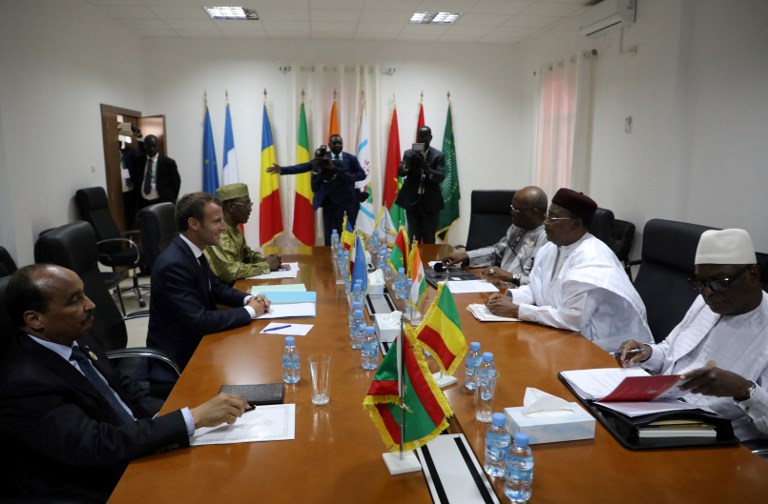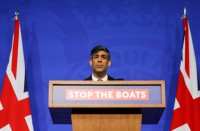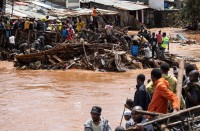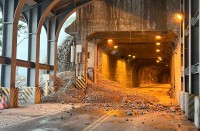
by Hademine Ould Sadi
© Agence France-Presse
NOUAKCHOTT, Mauritania (AFP) – French President Emmanuel Macron joined African leaders gathered in the Mauritanian capital on the final evening of a summit overshadowed by security issues after jihadist rebels hammered two fragile Sahel states in successive attacks.
Macron held separate talks with the leaders of a five-nation African anti-terror unit backed by France to discuss financial and security hurdles the “G5 Sahel” force faces.
Five separate attacks in Mali and neighbouring Niger have killed 25 people since Friday.
“I reaffirm here the commitment of France and all G5 Sahel member countries to fight obscurantism, cowardice, whose first victims are Africans themselves,” Macron said on the sidelines of a two-day African Union (AU) summit.
As the summit opened on Sunday in Nouakchott, a bomb aimed at French soldiers in Mali’s troubled north killed four civilians and injured over 20 people. Four soldiers were among the wounded.
In Niger, Boko Haram insurgents targeted a military position in the southeast, killing 10 soldiers — a reminder of the peril that Nigeria’s notorious jihadists pose to neighbouring countries.
On Friday, a suicide bombing hit the headquarters of the G5 Sahel in central Mali, fuelling concerns about its ability to tackle jihadist groups roaming the region.
It was the first attack on the headquarters of the force, set up with French backing in 2017 to fight jihadist insurgents and criminal groups in the vast and unstable Sahel region.
The G5 Sahel leaders — from Burkina Faso, Chad, Mali, Mauritania and Niger — met Sunday to prepare for talks with Macron.
“We won’t let Mali fall apart, we will assume our responsibilities,” Malian President Ibrahim Boubacar Keita told France 24 on Monday.
Apparently linking insecurity in the Sahel to the migrant row shaking European politics, he warned: “If the Sahel falls to terrorist threats, the shores of the Mediterranean will be overwhelmed.”
Separately, the AU summit also decided to create a body, based in the Moroccan capital of Rabat, to better coordinate migration policies among African states and with Europe.
“These attacks should strengthen our determination to fight terrorism to ensure our populations’ security,” Niger’s President Mahamadou Issoufou told AFP.
He added that development was essential in the long run because “poverty provides a fertile ground for terrorism.”
Mauritanian President Mohamed Ould Abdel Aziz, hosting the AU gathering of more than 40 heads of state and government, warned that Friday’s attack on the Sahel force HQ had exposed regional security “failings.”
The Al-Qaeda-linked Support Group for Islam and Muslims, the main jihadist alliance in the Sahel, have claimed both Friday’s attack on the G5 Sahel base and Sunday’s on French troops.
The G5 aims to have a total of 5,000 troops from the five nations but has faced funding problems and lack of equipment.
It is intended to operate alongside France’s 4,000 troops in the troubled “tri-border” area where Mali, Niger and Burkina Faso meet, and alongside the UN’s 12,000-strong MINUSMA peacekeeping operation in Mali.
Free trade
The string of attacks in the vast Sahel region hijacked a summit agenda meant to focus on free trade, funding and corruption.
Currently, African countries only conduct about 16 percent of their business with each other, the smallest amount of intra-regional trade compared to Latin America, Asia, North America and Europe.
In March, 44 nations signed a pact in March to create the African Continental Free Trade Area (CFTA) — billed as the world’s largest in terms of participating countries.
Five new countries signed the agreement on Sunday: Burundi, Lesotho, Namibia, Sierra Leone and South Africa, one of the continent’s economic heavyweights and notable CFTA absentee until then. Six countries have ratified it, out of the 22 needed for it to come into effect.
The fruit of two years of negotiations, the CFTA is one of the AU’s flagship projects for greater African integration.
“Significant progress was made towards creating the Africa we want,” Rwandan leader Paul Kagame, who holds the presidency of the 55-nation African Union, told reporters as the summit came to a close.
If all 55 AU members eventually sign up, it will create a bloc with a cumulative GDP of $2.5 trillion (two trillion euros) and cover a market of 1.2 billion people.
The body also endorsed Rwanda’s candidacy to head the International Organisation of La Francophonie, the world association of French-speaking nations, diplomatic sources said on Monday.







